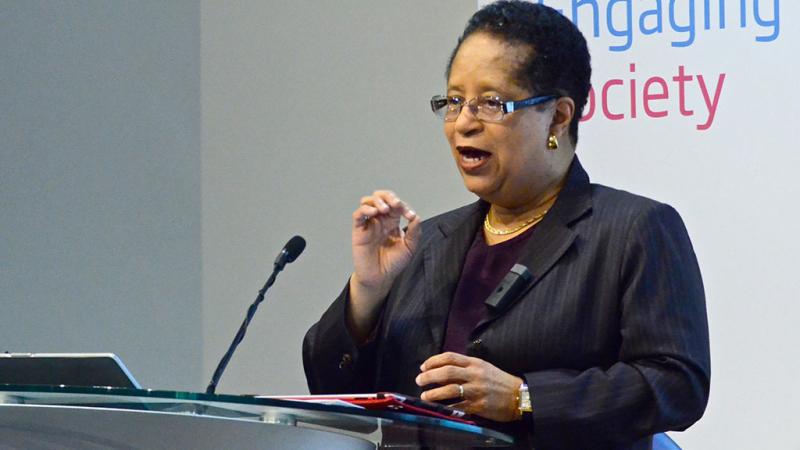In Speech to the Royal Academy of Engineering She Envisions a “New Polytechnic” To Enhance Leadership and Education in the New Digital Economy
January 23, 2013

Rensselaer Polytechnic Institute President Shirley Ann Jackson has called for a new way of working and learning to harness the power of science and technology—particularly in the arenas of “Big Data,” high performance computing, and web science—for the urgent purpose of developing answers to the intersecting challenges of energy, food, water, health, and national security, climate change, and natural resource allocation, which are fundamental to our daily lives and to the long-term viability of the planet.
President Jackson spoke at the Royal Academy of Engineering, in London, England, delivering the 2013 ERA Foundation International Lecture on Tuesday, January 22, 2013.
Calling for increased collaboration across disciplines and sectors, Jackson said, “The urgent, global concerns that we face in the 21st century, and beyond, are more complex and even more subject to intersecting vulnerabilities. These challenges … will take all that we have in terms of ingenuity, collaboration, and good judgment. These are challenges of unprecedented magnitude, too complex to be resolved by the independent actions of those working in isolation. Because they are critical to our world, and to the ultimate survival of humankind, they demand the best of our imagination and creativity, careful deliberation, tremendous resourcefulness, and the strictest focus and discipline.”
Envisioning a “new Polytechnic,” Jackson noted that “effective use of advanced technological, collaborative platforms strongly suggests the need for a shift beyond traditional leadership, both in process and in personal approach.”
As the world becomes more digitally interconnected and data driven, Jackson said we “will use data in ever more sophisticated ways, while exploiting our ubiquitous interconnectivity. In fact, the interconnectivity of people and things is generating massive amounts of data. To make sense of all that data requires us to exploit that very interconnectivity to collaborate in new ways. It requires us to break out of disciplinary silos, exploit new technological tools, employ high performance computing, data aggregation, and analytics.”
“The new Polytechnic requires that leaders acquire new skills for a digitally interconnected environment, that they balance authority with engagement, understand nuances of culture and language, seek new ways to establish trust among, within, and between virtual teams. With more diverse, digitally connected audiences—participants who may never before have had a voice, and may even be volunteers—and with less hierarchical dynamics, there will be concerns about trust on multiple levels. Leaders must recognize value in divergent perspectives and manage opposing expectations. And, they must accomplish all this in a virtual environment where the leader may never look participants in the eye or shake their hands,” President Jackson said. “To bring people together, new leaders must have the ability to ‘translate’ between and among disciplines and sectors. They will need to incorporate analyses and insights from diverse fields including the cognitive and social sciences, and bring them to bear on a given challenge.”
Jackson believes that a more interdisciplinary approach “will impact research in powerful new ways. It will impact the profession of teaching as we enlist the next generations of students in this construct, and educate them to be leaders in the digital economy.”
“To address access to clean water, food and energy security, health security and disease mitigation, and other urgent global challenges, the new Polytechnic—utilizing advanced technology to combine a multiplicity of perspectives and disciplines—can lead to greater vision and deeper understanding, and is our best bet for assuaging the human hunger to know and to remedy, and the human desire for uplifted lives,” President Jackson said.
For the text of the lecture, titled “The New Polytechnic: Collaboration and Leadership Across Disciplines and Sectors to Address Urgent Global Challenges,” go to http://www.rpi.edu/president/speeches/ps012213-era.html
Background on President Jackson
A theoretical physicist, Dr. Jackson has held senior leadership positions in government, industry, research, and academe. Her research and policy focus includes global energy security and the national capacity for innovation, including addressing what she has dubbed the “Quiet Crisis” of looming gaps in the science, technology, and engineering workforce and reduced support for basic research. Dr. Jackson was chairman of the U.S. Nuclear Regulatory Commission from1995 to 1999, and currently is a member of the President’s Council of Advisors on Science and Technology (PCAST), co-chairs the President’s Innovation and Technology Advisory Committee (PITAC), and is a member of the U.S. Department of State International Security Advisory Board (ISAB). She is a member of the British Royal Academy of Engineering, the U.S. National Academy of Engineering, the American Philosophical Society, and a Fellow of the American Academy of Arts and Sciences, the American Physical Society, and the American Association for the Advancement of Science (AAAS). She is a Regent of the Smithsonian Institution, and a member of the Board of the Council on Foreign Relations and The Brookings Institution. She is a vice-chair of the Council on Competitiveness and co-chaired its Energy Security, Innovation and Sustainability initiative. She also is a member of the Board of Directors of global companies including IBM and FedEx.
About Rensselaer
Rensselaer Polytechnic Institute, founded in 1824, is the nation’s oldest technological research university. The university offers bachelor’s, master’s, and doctoral degrees in engineering, the sciences, information technology, architecture, management, and the humanities and social sciences. Institute programs serve undergraduates, graduate students, and working professionals around the world. Rensselaer faculty are known for pre-eminence in research conducted in a wide range of fields, with particular emphasis in biotechnology, nanotechnology, computation and information technology, the media arts and technology, and energy and the environment. The Institute is well known for its success in the transfer of technology from the laboratory to the marketplace so that new discoveries and inventions benefit human life, protect the environment, and strengthen economic development.
For more information about Rensselaer Polytechnic Institute go to: http://www.rpi.edu/
For information about the Royal Academy of Engineering go to: http://www.raeng.org.uk/
For information about the Royal Academy of Engineering’s 2013 ERA Foundation International Lecture go to: http://www.raeng.org.uk/events/pdf/ERA_InternationalLecture2013.pdf